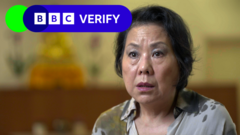An alarming trend has emerged as scammers in Western countries target older Chinese women with a deceptive blessing scam, convincing them their loved ones are in danger and extracting their valuables. As families seek justice, police investigations are underway to trace the perpetrators of these emotionally manipulative schemes.
A Deceptive Blessing: The Rising Threat of Scammers Targeting Chinese Communities

A Deceptive Blessing: The Rising Threat of Scammers Targeting Chinese Communities
Chinese communities around the world are facing a surge of sophisticated scams that exploit cultural beliefs, leaving victims devastated and desperate for answers.
In an alarming series of events, scammers are preying on vulnerable members of Chinese communities across the UK, US, Australia, and Canada, using an elaborate con that revolves around cultural beliefs. Known as the "blessing scam," this insidious scheme typically involves a group of women approaching unsuspecting victims in public spaces, often under the guise of seeking help for a relative in distress.
Mungnee, a Chinese Malaysian woman in her sixties, recently fell victim to this scam while walking down Harrow Road in West London. A distraught woman approached her, speaking Cantonese and asking if she knew a local Chinese healer for her ill husband. Mungnee's instincts to help led her into a web of deceit as a second woman appeared, claiming familiarity with the healer and offering to guide them.
Once away from the public eye, a third accomplice joined in, asserting that the healer had ominous news about Mungnee's own safety. According to the ruse, her son was purportedly in grave danger, and the only way to protect him was through a blessing involving her valuables. Under the scam's pressure, Mungnee hurried home to fetch her jewellery and withdraw £4,000 in cash, only to discover upon returning that the bag given to her contained merely a brick, a piece of cake, and water.
This troubling pattern has been echoed by numerous other victims, all reporting similar tactics and narratives, leading police in several countries to issue warnings. Anqi Shen, a law professor and former police officer, highlights that these scams exploit deeply held spiritual beliefs prevalent in Chinese culture concerning protective charms made from personal valuables.
Activism against these scams has begun, led by individuals like Tuyet van Huynh, whose mother fell prey to a similar con. Tuyet has been gathering evidence and raising awareness through social media following her mother's traumatic experience. She has employed CCTV footage to track the scammers’ movements, baffled by the lack of recollection her mother has about the incident.
Questions surrounding the mechanism of influence led Tuyet to speculate whether her mother had been unknowingly drugged—a theory hinting at the use of Scopolamine, known colloquially as "Devil's Breath." Though there is no concrete evidence confirming its application in these scams, the potential existence of such tactics raises disturbing questions about the methodologies of organized crime.
With police investigations ongoing and testimonies pouring in from victims across multiple cities, it becomes apparent that the con artists remain elusive. Mungnee’s determination to assist law enforcement in capturing the scammers speaks to the deep sense of community shared by the victims. Their collective outrage is compounded by an underlying hurt; the scammers are exploiting individuals within their own cultural group.
As awareness grows and investigations continue, there exists a glimmer of hope that these deceptive maneuvers can be curtailed, protecting vulnerable individuals from becoming unwitting participants in such tragic scams.





















